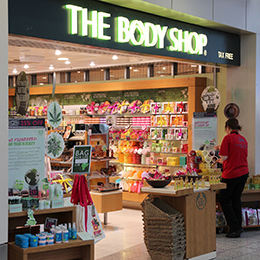The Body Shop’s future ownership is being highly discussed after rumors that the giant is reportedly interested in selling the brand after a decade of ownership. L’Oréal acquired the company in 2006, but has been struggling with it ever since, despite its overall robust corporate performance. Once seen as a good opportunity to enter the vertically-integrated specialty channel, the sole channel in which L’Oréal was not yet present, The Body Shop is nowadays the only boutique beauty retailer chain in the United States among the top 10 that registered a sales decline in 2016, according to Kline’s Boutique Beauty Retailers: Channel Analysis and Opportunities report.
One of the main challenges The Body Shop experiences is that is not truly natural. According to Kline’s Natural Personal Care Global Series study, the brand falls in the “nature inspired” range of Kline’s proprietary rating scale that assesses the degree of naturalness based on a sampling of a brand’s product formulations. Consumers are becoming increasingly savvier about decoding these labels themselves, and thus higher growth has been seen in the “truly natural” side of the market in all of the countries tracked by Kline.
Anita Rodrick, The Body Shop’s legendary founder, built the chain around core social and environmental values, a key differentiator in its early years. However, in the last decade or two, being ethical and sustainable has become less unique and mainstreamed into nearly every brand’s practices. Meanwhile, The Body Shop faces fierce competition from rising players like Lush, Sabon NYC, and Neal’s Yard in specialty retailing and Honest Beauty, Shea Moisture, and Dr. Hauschka in natural personal care, who are continuously innovating their product portfolios and shopper experiences to cater to consumers’ evolving demands.
To achieve a true turnaround and revitalization of the business, The Body Shop needs to channel its “inner Apple” to determine how it can both re-establish its relevance and connection with consumers. The brand plays in both a crowded natural space and a dynamic channel that makes it challenging to determine how to differentiate and stand out from other brands/retailers. On the other hand, the natural trend is substantial and ever-evolving in terms of environmental impact and consumer concerns/activism, thus a good strategy is to evolve its positioning and take advantage of future environmental changes. Equally important is building its social media base and online presence to resonate with millennials, while some store closures will likely be warranted.
The ideal new owner will have vast experience and a vision on how to move the business forward. Financial buyers are a good fit due to their experience in improving a firm’s financial performance. An ideal financial buyer would also have other beauty or fashion retail businesses in its portfolio, enabling them to leverage this know-how on The Body Shop.
Another beauty retailer or beauty brand seeking brick-and-mortar access could also offer potential to The Body Shop. L Brands is a possibility as it already owns Victoria’s Secret Beauty and Bath & Body Works. In this scenario, the firm needs to assess the overall business performance with The Body Shop, their vision on how to improve the business, and the potential impact/cannibalization with its other beauty retail brands. Other brands that may view The Body Shop as a good opportunity could include foreign beauty brands without a U.S. retail footprint. Some of the Korean brands or Brazil’s Natura that are seeking growth in the United States could find the ready infrastructure appealing, but the challenge will be how to retain value in The Body Shop brand and product portfolio.
What’s next? Nobody knows yet, but we will continue to monitor The Body Shop’s performance as well as other natural brands and freestanding stores through our Natural Personal Care Global Series and Boutique Beauty Retailers: Channel Analysis and Opportunities reports. New editions will be announced soon!

